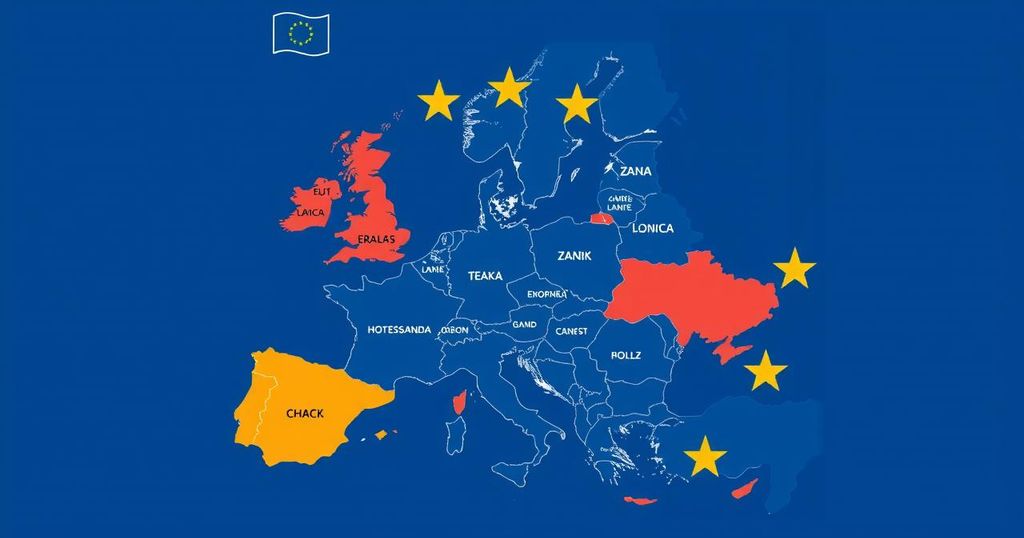A recent report accuses the EU of indirectly funding forced deportations from Türkiye, highlighting the plight of migrants in detention centers. European Commission President Ursula von der Leyen has proposed ‘return hubs’ while facing backlash from NGOs regarding the safety of Tunisia for disembarkation. Amid increasing migration due to regional conflicts, over 300,000 individuals have fled Lebanon into Syria. Both Egypt and Tunisia are reportedly uninterested in EU migration agreements, while Libya’s cooperation appears to be improving.
The European Union (EU) is facing significant criticism regarding its alleged indirect support of forced deportations from Türkiye to Syria and Afghanistan, as revealed in a new investigative report. European Commission President Ursula von der Leyen has called for the establishment of ‘return hubs’ in preparation for forthcoming discussions on migration policy within the European Council. A classified document has disclosed that both Egypt and Tunisia harbor reluctance toward formal migration agreements with the EU while indicating a more favorable cooperation with Libya. Furthermore, over 60 non-governmental organizations (NGOs) have condemned Tunisia as being an unsafe destination for disembarking individuals rescued in the Mediterranean Sea, urging the cessation of EU-Tunisia migration partnerships. In addition, a humanitarian crisis is unfolding, with more than 300,000 individuals reportedly fleeing Lebanon into Syria amid escalated conflict. The investigative report published by Lighthouse Reports, in association with leading news outlets, illustrates that the EU has allocated hundreds of millions of euros to a covert deportation system effectively operating on its periphery. The report describes dire conditions within EU-funded detention centers where Syrians and Afghans face severe human rights abuses, including torture and forced deportations. A former detainee recounted: “I was going to buy household supplies when the Turkish police arrested me. In prison, we were severely tortured, beaten and insulted; they also detained us in a refrigerator for up to 12 hours. They forced us to sign voluntary deportation papers.” Former European Commission officials acknowledged internal concerns regarding human rights violations associated with EU funding for Türkiye; such issues have been recurring topics of concern among EU officials. The upcoming discussions on migration, slated for 17 October in Brussels, will likely address von der Leyen’s proposal for return hubs, which critics argue would undermine asylum rights and exacerbate inhumane treatment of migrants. Dutch Member of Parliament Tineke Strik criticized the proposal, stating it “indirectly undermines the right to asylum, solidarity and the just adopted migration pact”. As migration routes remain fraught with peril, the assessment of relationships with Egypt and Tunisia remains disheartening, while there is a more optimistic outlook for collaboration with Libya. As documented, Egypt is not interested in forming a migration agreement, while Tunisia has not shown significant interest in negotiations to expedite personal data exchange with EU agencies. In light of the dangerous conditions in Tunisia for refugees, particularly severe violations against migrants, the NGOs emphasize the imperative for the EU to discontinue cooperation in migration control with Tunisian authorities. The situation is further compounded by reports from Lebanon of around 310,000 people fleeing into Syria since the onset of renewed military confrontations. Witness accounts describe extensive extortion practices occurring at military checkpoints alongside harrowing conditions people experience as they traverse perilous borders, making their plight even more desperate. The EU’s strategy to address migration issues is under increasing scrutiny, amidst calls for a more respectful and humane approach in dealing with the migratory crises. The migrants’ current reality, compounded by the EU policy approaches, continues to provoke advocacy from both within the EU and humanitarian organizations vigorously protecting migrants’ rights in perilous circumstances.
The ongoing migrant crisis at the EU’s borders reflects broader geopolitical tensions and humanitarian challenges. The EU’s relationships with its external partners—particularly Egypt, Libya, and Tunisia—are pivotal in managing migration and asylum policies. Recent escalations, especially in the Middle East, have exacerbated the flow of displaced individuals seeking safety, complicating the EU’s response. Revelations regarding the EU’s funding processes have raised pressing concerns about human rights violations and the ethical implications of directly or indirectly supporting coercive practices on the ground. Reports from regions including Lebanon highlight the urgent need for reform and reevaluation of the EU’s migration strategies, grounded in humanitarian principles.
The EU is currently confronting a significant dilemma concerning its migration policies and partnerships, particularly with Türkiye and North African nations. The documented human rights abuses, coupled with inadequate responses to the burgeoning refugee crisis, prompt critical reassessments of the EU’s approach. Advocacy groups have strongly condemned the EU’s dealings with countries that fail to ensure safety for migrants, particularly in light of the alarming conditions encountered in Tunisia. As discussions proceed within the European Council, it is imperative that the EU adopt strategies prioritizing protection, dignity, and humane treatment for all individuals seeking refuge.
Original Source: ecre.org






